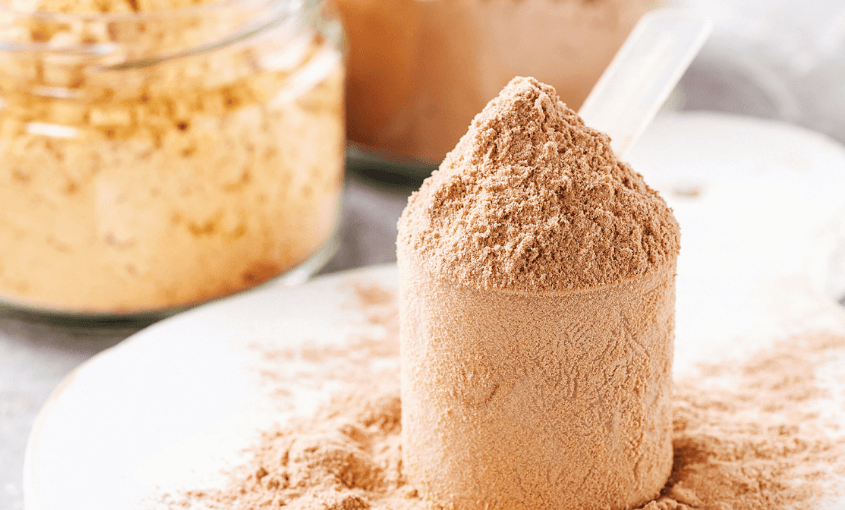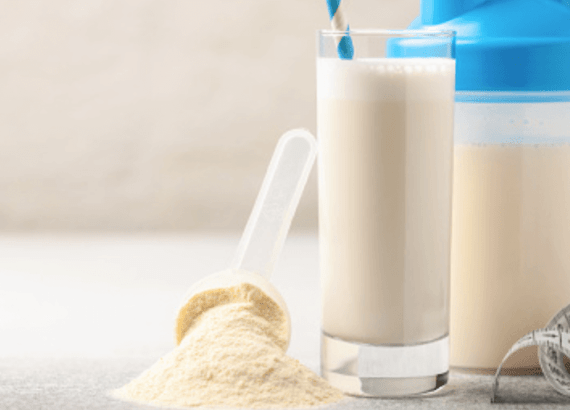How Many Scoops of Protein Powder a Day: A Practical Guide

When it comes to achieving our health and fitness goals, protein holds a significant role. It’s the foundation of our muscles, aids in post-workout recovery, and plays a crucial role in numerous bodily functions.
As protein supplements have gained popularity, one question that often arises is, “How many scoops of protein powder in a day?”
Protein powder has surged in popularity as a convenient and effective way to meet our daily protein requirements, but the intricacies of its consumption remain a subject of curiosity and debate.
We’ll explore factors such as your goals, activity levels, body weight, and other essential considerations that influence the recommended daily dosage of protein powder.
Let’s dig in and find out how many scoops of protein powder a day will work best for you!
Knowing What Proteins You Need
Protein is an essential macronutrient that plays a vital role in our body’s structure, function, and health.
Whether you’re an athlete, a fitness enthusiast, or someone simply looking to maintain a balanced diet, understanding your protein needs is crucial.
Knowing what proteins you need is essential for maintaining good health, as proteins play a crucial role in various bodily functions. Proteins are composed of amino acids, which are the building blocks of the body.
They are involved in processes such as tissue repair, enzyme production, immune system function, and the formation of hormones and antibodies.
Understanding the different types of proteins and their specific roles is essential in ensuring we meet our nutritional needs.
To determine the proteins you need, considering factors like age, activity level, and health goals is essential.
For example, athletes or individuals engaged in regular vigorous exercise may require more protein to support muscle growth and recovery.
On the other hand, older adults may benefit from higher protein intake to counter muscle loss associated with aging.
It is also important to focus on obtaining a variety of proteins from different sources to ensure a well-rounded nutrient profile.
This can include lean meats, poultry, fish, eggs, dairy products, legumes, and plant-based protein sources such as nuts, seeds, and soy products.
Working with a healthcare professional or a registered dietitian can help determine the specific protein requirements and create a personalized plan to meet those needs.
The Role of Protein in the Body
Protein plays a crucial role in the human body and is involved in numerous essential functions. Here are some of the key roles that protein serves:
Building and Repairing Tissues
Proteins are the building blocks of body tissues such as muscles, bones, skin, and organs. They provide the structural framework and integrity necessary for the growth, maintenance, and repair of these tissues.
Enzyme Production
Many proteins act as enzymes, which are biological catalysts that regulate chemical reactions in the body.
Enzymes are involved in various processes, such as digestion, metabolism, and DNA replication. Without proteins, these vital reactions would occur too slowly or not at all.
Transport and Storage
Some proteins serve as transporters, carrying important molecules like oxygen, hormones, and nutrients throughout the body.
For example, hemoglobin is a protein responsible for transporting oxygen in the blood. Additionally, proteins contribute to the storage of minerals and nutrients in cells.
Immune Function
Antibodies and other immune system components are proteins that help defend the body against pathogens (such as bacteria and viruses) by recognizing and neutralizing them. These proteins also play a role in inflammation and wound healing.
Hormone Production
Some proteins act as hormones or contribute to hormone production. Hormones are chemical messengers that regulate various physiological processes, including growth, reproduction, metabolism, and stress response.
Energy Source
Though carbohydrates and fats are the body’s primary sources of energy, protein can be broken down and used for energy when other sources are limited.
However, this is not an efficient process, and the body prefers to utilize protein for its essential functions rather than as an energy source.
Importance of Protein Powder
Protein powder is widely regarded as an essential supplement by athletes, fitness enthusiasts, and individuals pursuing specific health goals.
Its importance lies in its ability to support various aspects of physical performance, muscle growth, and well-being. Here are some key points about the importance of protein powder:
- Muscle Growth and Repair: Protein plays a fundamental role in muscle growth and repair. When we exercise, our muscles experience micro-tears that need to be repaired. Protein powder, especially those derived from high-quality sources like whey or casein, provides a concentrated dose of essential amino acids that are crucial for muscle recovery and growth.
- Convenient Source of High-Quality Protein: Protein powder offers a convenient way to meet your daily protein requirements, especially for individuals who may struggle to consume enough protein through whole food sources alone. It allows for quick and easy protein supplementation, whether it’s in a shake, smoothie, or mixed into other foods.
- Weight Management and Appetite Control: Protein is known to be more satiating than carbohydrates or fats. Including protein powder in your diet can help curb cravings and promote feelings of fullness, which may support weight management and healthy eating habits. By increasing protein intake, you can potentially reduce calorie consumption while preserving muscle mass.
- Performance and Recovery: Protein plays a critical role in supporting athletic performance. Adequate protein intake enhances muscle strength, power, and endurance. Protein powder can be consumed before or after workouts to optimize muscle recovery, reduce muscle soreness, and promote athletic performance.
- Nutrient Timing and Quick Absorption: Protein powder is often recommended for its quick absorption rate, making it an ideal option for post-workout nutrition. After exercise, your muscles are especially receptive to protein, and consuming it in the form of a protein shake can expedite the delivery of essential amino acids to your muscles for optimal recovery.
Protein Powder Sizes and Variations
Protein powder comes in various sizes and variations to cater to different preferences, dietary needs, and fitness goals.
Here are some common protein powder sizes and variations available in the market:
Container Sizes
Protein powder is commonly sold in containers of different sizes, typically ranging from 1 pound (454 grams) to 5 pounds (2.27 kilograms) or even larger.
The size of the container depends on personal usage preferences and frequency of consumption.
Smaller containers are useful for those who want to try different flavors or are occasional users, while larger containers are popular among regular consumers.
Protein Sources
Protein powders can be made from different sources, each with its unique characteristics and benefits. Some popular protein sources include:
Whey Protein
Derived from milk, whey protein is one of the most common and widely available protein powders.
It is quickly absorbed by the body and contains a rich amino acid profile, making it ideal for muscle recovery and growth.
Casein Protein
Also derived from milk, casein protein is slower to digest than whey protein. It forms a gel-like substance in the stomach, providing a sustained release of amino acids over a longer period.
It is often recommended as a nighttime protein supplement to support overnight muscle repair.
Plant-Based Protein
Plant-based protein powders are derived from sources like soy, pea, brown rice, hemp, or a blend of these.
They are suitable for vegetarians, vegans, or individuals with dairy or lactose intolerances. Plant-based protein powders offer a wide range of amino acids and can be just as effective as animal-based protein powders.
Flavors
Protein powders are available in a variety of flavors to suit different tastes. flavors include chocolate, vanilla, strawberry, cookies and cream, peanut butter, and more.
Some brands also offer unflavored protein powders, which can be easily added to smoothies, baked goods, or other recipes without altering the taste.
Formulations
Protein powders can come in different formulations to meet specific needs. Some variations include:
- Isolate Protein: This form of protein powder is highly purified, typically containing over 90% protein with minimal carbohydrates and fats. It is ideal for those looking for a high protein content with fewer additional nutrients.
- Concentrate Protein: Concentrate protein powders have a slightly lower percentage of protein (around 70-80%) compared to isolates. However, they often contain more carbohydrates, fats, and other nutrients, making them a more balanced option.
- Blends: Protein blends combine different protein sources, such as whey and casein, to provide a mix of fast- and slow-digesting proteins. This combination can ensure a sustained release of amino acids for muscle recovery and growth.
Potential Side Effects and Precautions
Here are some examples of potential side effects and precautions to consider for medications and treatments:
Allergic Reactions
Some individuals may experience allergic reactions to certain medications, such as rashes, hives, swelling, or difficulty breathing.
If you have a known allergy, inform your healthcare professional and read the product packaging for any potential allergens.
Gastrointestinal Issues
Common side effects of some medications include nausea, vomiting, diarrhea, or constipation.
If these symptoms become severe or persistent, consult your healthcare professional for guidance.
Drowsiness or Dizziness
Certain medications, especially those that affect the central nervous system, can cause drowsiness or dizziness.
Exercise caution when operating machinery, driving, or performing tasks that require alertness or coordination.
Interactions with Other Medications
Some medications may interact with others, leading to potentially harmful effects.
Inform your healthcare professional about all the medications, supplements, or herbal products you are taking to avoid potential drug interactions.
Adverse Reactions in Specific Populations
Some medications may have specific precautions or different dosage recommendations for certain groups such as children, pregnant or breastfeeding women, or the elderly.
Consult your healthcare professional to ensure the safety and efficacy of the treatment.
Organ Toxicity
Certain medications can have adverse effects on specific organs, such as the liver, kidneys, or heart. Regular monitoring of organ function may be required while on these medications.
Conclusion
While protein powder can be a beneficial addition to a balanced diet and fitness routine, it is essential to approach its consumption with mindfulness and to consider an individual’s unique requirements and goals.
Moderation, along with an well-rounded approach to nutrition and exercise, is key to achieving optimal health and fitness outcomes.
The question of how many scoops of protein powder a day is highly individualized and dependent on various factors such as age, weight, activity level, and specific health goals.
Moreover, it’s crucial to consider that protein powder should supplement, not replace, whole food sources of protein.
A well-balanced diet that includes lean meats, poultry, fish, legumes, dairy products, and plant-based protein sources should be the primary focus.
Protein powder can be a convenient option to supplement protein intake in cases where it may be challenging to meet daily requirements through whole foods alone.

As a dedicated medical professional with years of experience, Dr. Roksana Parveen understands the importance of taking a comprehensive approach to health and wellness. She believes in the power of education to provide evidence-based information to help individuals about their health.
More From Me
Connect with me and get latest updates. - Dr. Roksana Parveen













